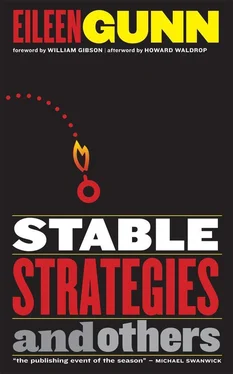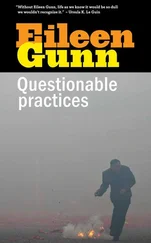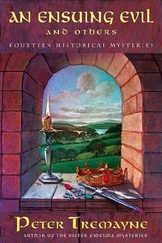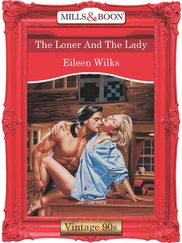“I never flunked a chemistry test in my life.”
He laughed. The sounds of coughing below grew louder.
“What the fuck,” yelled Carl, from the floor. “Anything’s better than just standing around with our thumbs up our asses.” He reached for a canister, without even bothering to read the label.
“All right!” said T’Shawn. “Acetic acid.” He laughed.
“No,” said Barbara. “We really have to help them.”
“Not yet,” he said. “We’ve got a couple of minutes.”
Minerva was choking and sobbing.
“I’m sorry,” she said, and let go of him. She took a deep breath, and dropped to the floor. She made her way to the front of the classroom, eyes watering, and found the canisters that Mr. C had set out. Hydrogen peroxide — that would do it. Oxidize the hydrogen sulfide and stop the reaction. She grabbed the h2°2 and baptized the burette.
The production of caustic gas stopped, and Mr. C gave her a thumbs up, then unlocked the door and opened the windows. He smiled genially. “Barbara, you did very well, though it took you a bit longer than I expected. A+ for you. Carl, you were about to toss acetic acid into the burette, which would have liberated the hydrogen sulfide more quickly, raising it to lethal levels. I’m afraid you flunked. The rest of you will be graded on the curve. Take five megs of vitamin C and get a good night’s sleep away from nuclear fallout. Next time I tell you to study for a quiz, I’ll expect better results.”
“Way to go, Carl,” said Minerva hoarsely.
“Asshole,” said Angela. “Class president. Hah. Class turd.”
Carl was studying his shoes. He didn’t look up.
Friday was the day of the Celebration of Life for Mrs. R. The bus from Cobain Magnet High lumbered through the gates of the cemetery. Inside, Barbara looked at a hillside marked with uneven rows of oddly shaped tombstones. Grey granite plinths, long red chaises-longues like swimming-pool furniture, low cement scrolls with lambs lying on top, Japanese garden lanterns. It wasn’t a nice tidy cemetery where all the headstones were set flush with the ground so they didn’t get in the way of the lawnmowers. It was a little wild-looking, with weird bits — kind of like Barbara’s hair, actually. There were weeds.
A row of huge cement boxes blocked the road beyond the sign. They were maybe eight feet long, four feet square. Not recyclable. These boxes were built to last, and to keep whatever was inside from getting free. Barbara wondered what they were. Then the bus stopped abruptly and the rude truth about cemeteries hit home. Duh.
“He-e-ere we are!” said Mr. Simmons, the death sciences instructor. He got up from his seat and stood in the aisle, facing the special-skills students. Nobody paid any attention to him, except for Barbara, who wished she’d gotten a seat further back with her friends, not that she had any.
Mr. Simmons jangled his key-ring against a bronze plaque that was bolted to the back of the driver’s seat. At one time it had read “Sponsored by Microsoft — Boeing,” but someone had lasered it to say “Sponsored by Microsoft — Boring.”
The class quieted down. “Everybody out for Eternity,” said Mr. Simmons cheerfully.
The students dragged themselves out of their seats and fought for standing room in the aisle. Carl was first off the bus, of course. He leaped into the grey November chill and scoped out the terrain.
“Note the cement bunkers to your left as you exit the bus,” said Carl. “If anybody starts shooting, get those bunkers between you and the guns as fast as you can.”
Barbara wondered if she could project her thoughts to bounce off the sides of the boxes, like billiard balls. Risky, but she thought she could do it. She rounded her thoughts into a ball, smoothed off the clues to who she was, and flung them at an angle between two cement boxes. “They’re tombs , not bunkers, you sphincter!” She blanked her mind and tried to look nonchalant.
“ — sphincter! — sphincter! — sphincter!” Huh. There was such a thing as a psychic echo.
Carl whipped his head around, and all the other telepaths snickered. He looked suspiciously at Barbara, but she was doing logarithms in her head. “Buttmunch,” he muttered.
Hah. Leadership suck. Nobody was going to shoot at them in the cemetery. Jeez.
Mr. Simmons was talking about some guy who was buried in the cemetery. “Interesting man, Bruce Lee,” he said in a musing tone. “He was an actor and a martial arts expert. Bit of a philosopher, too. Started his own martial arts school….
“There was a TV show called Kung Fu ,” he continued. “Supposed to be about the spiritual side of Asian martial arts. But Bruce Lee found that there were no acting parts for a Chinese martial artist and philosopher on a show about Chinese martial arts and philosophy. They gave his part to a hippie white guy.”
“That guy’s buried next to Brandon Lee, that goth actor,” said Minerva. “Wonder if they’re related.”
Mrs. R’s grave was towards the back of the cemetery, near the chainlink fence that separated it from the playground at Volunteer Park. It was dark there even in the middle of the day, and it didn’t have the great view of the mountains that Brandon Lee had. Kind of where you’d expect to find someone who made a teacher’s salary.
There were a lot of people milling about in the cold. All the science classes from Cobain were there, of course, plus some college types who had probably gone to Cobain years before. There were old people she didn’t know, and even older people she was sure she’d never even heard of. Mrs. R’s family, probably.
A plumpish bearded guy in a dark suit sat on a folding chair near the grave, his head in his hands. He was trembling a little bit; he was crying, Barbie realized. She looked around, feeling helpless. She didn’t know guys would cry.
She held her body in a polite position that looked as if she was listening to the service, and set up a double-thick brick wall inside herself. She counted the bricks and got up to two thousand. She looked at the sky, which was astir with dark, bulbous clouds. She glanced around the crowd, and slipped away to its farthest edge. She didn’t want to listen to what people were saying about Mrs. R.
The road she was standing on was old, and had sunk a bit into the earth. There was a high curb containing the hillside, and Barbara sat down on its edge. The speakers’ voices droned on, trying to make sense of stuff that didn’t have to make sense.
At the back of the crowd, Carl stood on a gravestone to get a better view. Other kids followed his lead, of course, and soon there was a whole cluster of them standing there, a meter taller than anyone else.
Barbara cringed. She looked at the tombstones next to her, an odd arrangement of bed-like slabs of polished red granite with cylindrical pillows at their heads. There were two long ones, side by side, and a short one set at a right angle, like camp cots in a small tent.
She read the inscription on the short one’s pillow. Regina Mary Dugan. Born 1896, died 1901. A five-year-old child. The others would be her parents, Barbara thought. She read their pillows, to give the family all its names. Mary Frances Dugan, 1845–1883. T. Constantine Dugan, 1874–1901.
So Mary Frances died 13 years before Regina Mary was born. Her grandmother? Poor little kid. Buried next to some grandmother she’d never even met. With her father, probably. He died the same year, so maybe it was an accident that killed them both. Or a fire, and he tried to rescue her. Where was Regina’s mother? Remarried? Dead somewhere else, no doubt.
All these tombstones, Barbara thought, and though she tried to push it away, a vision came to her — in flashes, like a slide show. Pictures, click-click-click, each one a different gravesite, with different mourners. Each one a ceremony for someone who had died. Thousands of them. Dead now, dead then, dead to come. All those people left behind, weeping, alone. Their time would come, too. Buried with strangers.
Читать дальше












